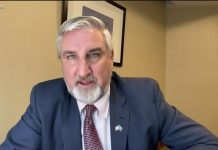State officials say the spike in initial unemployment claims in Bartholomew County earlier this month was related to Indiana restarting federal unemployment payments to workers affected by the pandemic after a court ordered the state to do so.
Earlier this month, initial jobless claims in Bartholomew County spiked to 519, up nearly eight-fold from levels seen week before, state records show.
State officials consulted by The Republic initially suspected that the spike was related to a “quarter change,” which is when claimants need to reapply for unemployment to continue receiving federal benefits. The county saw a similar spike in claims in April that state officials attributed to a quarter change.
However, state officials now have confirmed that the spike seen in July was related to Indiana restarting its participation in the federal program.
“The increase was more due to people needing to fill out their claims again after Indiana restarted the federal pandemic unemployment program,” Indiana Department of Workforce Development spokesman Scott Olson said Tuesday.
Indiana resumed making $300 federal unemployment payments to workers, issuing 25,000 payments totaling more than $33 million, on July 16, The Associated Press reported.
The payments come more than a month into a legal battle over the state’s participation in federal programs that expanded unemployment benefits during the pandemic.
In addition to resuming the $300 payments, officials said the state has restarted its participation in a federal program that makes gig workers and the self-employed eligible for assistance for the first time and another that provides extra weeks of aid, according to wire reports.
Republican Gov. Eric Holcomb, who has pushed to drop the state from the federal programs before they’re scheduled to end on Sept. 6, announced in May that Indiana would reinstate a requirement that those receiving unemployment benefits would again have to show they were actively searching for work as of June 1 and that the state would leave the federal programs effective June 19.
Marion Superior Court Judge John Hanley granted a preliminary injunction in an ongoing lawsuit filed June 14 by two legal organizations, ruling that the state must temporarily resume participation in the federal government’s programs that provide unemployment benefits during the pandemic, according to wire reports.
In his order, Hanley said Indiana’s decision to leave the federal program early violates state law, adding that the unemployment benefits are “instrumental in allowing Hoosiers to regain financial stability at an individual level while the state continues to face challenges presented by the COVID-19 pandemic during its return to normalcy.”
The state attorney general’s office asked the Indiana Court of Appeals to quickly stay Hanley’s order, arguing that the state couldn’t continue paying the benefits because it had already ended its agreement with the federal government to administer the federal programs, according to the AP. The state also argued that it wouldn’t have time to withdraw from the federal programs again should the appeals court rule in its favor.
But the appeals court upheld Hanley’s order on Monday.
State officials have not said whether they will next ask the Indiana Supreme Court to consider the preliminary injunction, according to wire reports. Should it do so and prevail in the higher court, though, claimants wouldn’t be asked to return payments, said Fred Payne, the head of the Department of Workforce Development.
The $300 checks have more than doubled Indiana’s average $280 weekly unemployment payment, which has a maximum of $390 a week, according to the state agency. The changes cut off or reduced unemployment benefits to around 120,000 people in the state during the hiatus, Ashley said.
Holcomb and other state leaders have maintained that jobs are available around the state, and that ending the benefits early would help businesses find and hire qualified employees for thousands of open positions, according to wire reports. Supporters of the federal payments say they’ll help workers get by while looking for good jobs and that businesses should offer better pay and benefits to attract workers.





